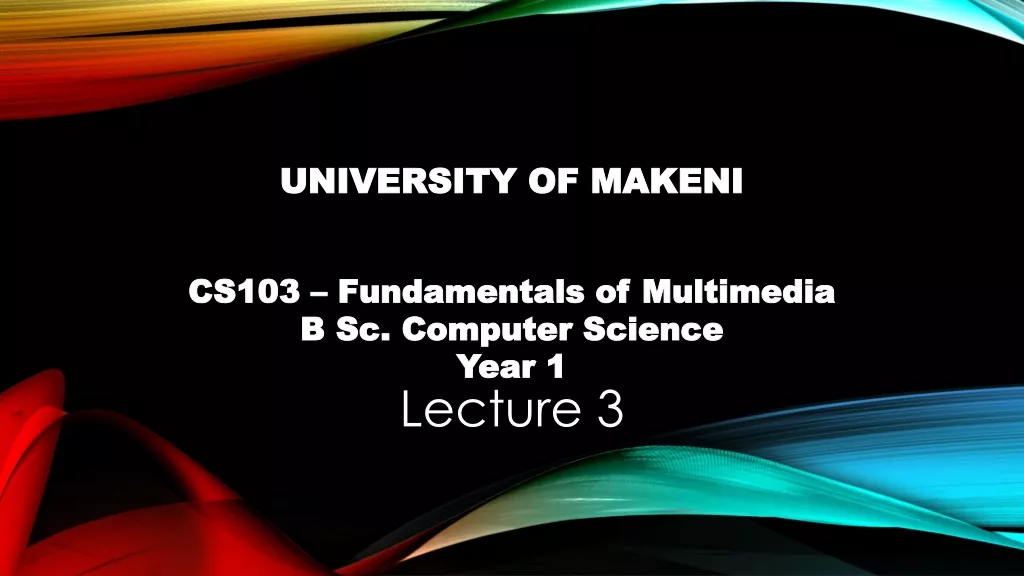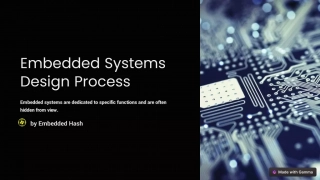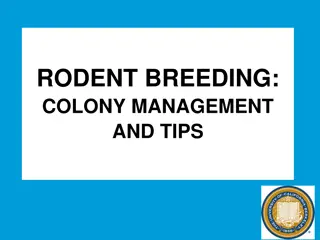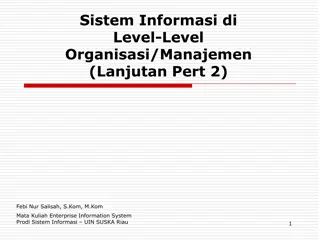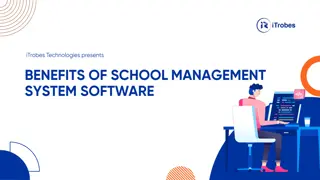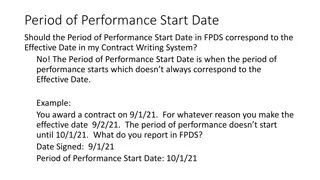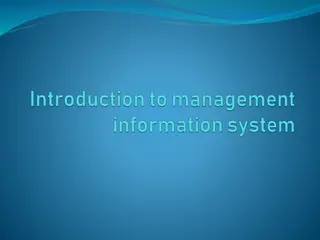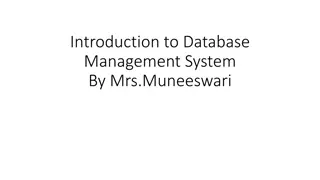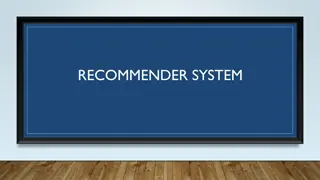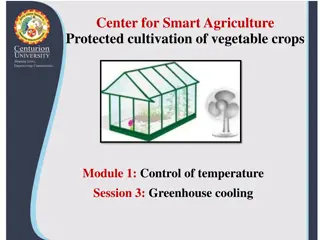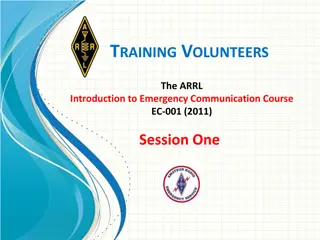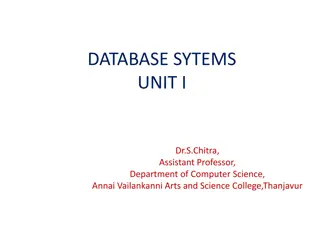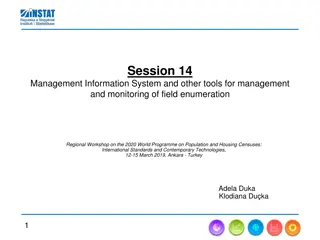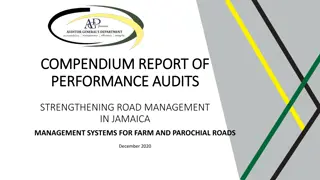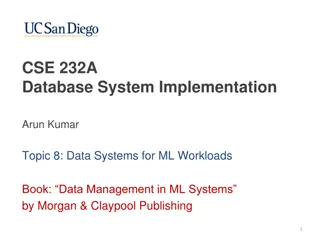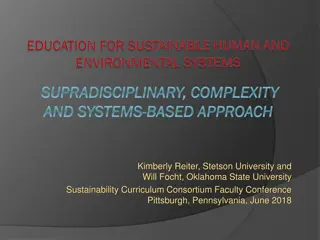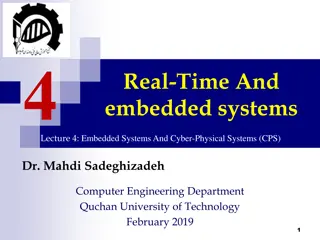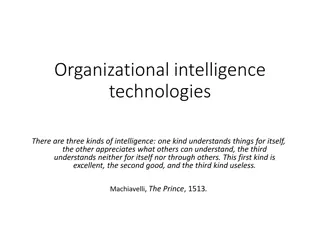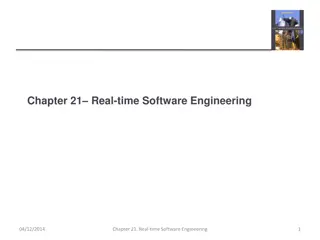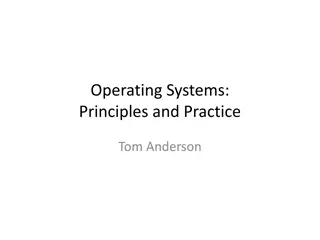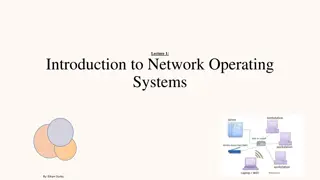Multimedia Systems: Hardware and Software Components
Multimedia systems require specific hardware and software components to meet the demands of producing and playing multimedia content. Development systems are used for creating content with higher specifications, while playback systems are used for playing multimedia files with lower specifications.
9 views • 46 slides
Management Information Systems (MIS) in Business Organizations
Explore the world of Management Information Systems (MIS) in business settings, covering topics such as sales, supplier management, purchase orders, forecasting, stock details, customer orders, dispatch instructions, financial transactions, and more. Gain insights into the role of MIS in bringing or
2 views • 38 slides
FACILITY MANAGEMENT & SAFETY
Facility management and safety are interlinked disciplines crucial for optimizing workflow and ensuring a safe environment in various facilities. This includes managing space, infrastructure, resources, and staff effectively. Specific focus on laboratory facility management involves maintaining qual
4 views • 19 slides
Embedded Systems Design Process in the Embedded systems
Embedded systems are all around us, from the tiny microcontrollers in our household appliances to the sophisticated control systems in cars and aeroplanes. But how are these systems designed? Let's delve into the basics of the embedded systems design process in simple terms that anyone can understan
2 views • 9 slides
adonai software
Adonai college Management System is a cloud-based ERP System that delivers various College and School Management Systems, College and School Management Software, College and School Management System ERP, College and School Management Software System, Online College and School Management Software Sys
3 views • 1 slides
Guide to Efficient Rodent Breeding and Colony Management
This comprehensive guide covers essential aspects of rodent breeding, colony management, and tips for successful rodent reproduction. It includes details on weaning, retiring breeders, records management, problem-solving, resources, goals and planning, breeding systems, reproduction processes, genot
5 views • 35 slides
Overview of Distributed Systems: Characteristics, Classification, Computation, Communication, and Fault Models
Characterizing Distributed Systems: Multiple autonomous computers with CPUs, memory, storage, and I/O paths, interconnected geographically, shared state, global invariants. Classifying Distributed Systems: Based on synchrony, communication medium, fault models like crash and Byzantine failures. Comp
10 views • 126 slides
Operating Systems
An operating system is a crucial program that manages all other programs on a computer. It handles tasks like input recognition, file management, and device control. There are different types of operating systems such as single-user, single-task systems, multi-user, multi-task systems, real-time ope
6 views • 11 slides
Information Systems in Organizational Management
Management in organizations is divided into three levels: operational, tactical, and strategic. Each level requires different information systems to support various activities. Operational systems focus on routine transactions and control processes, while middle-level systems aid in semi-structured
10 views • 39 slides
Benefits Of School Management Systems
This presentation from iTrobes explains the transformative benefits of school management systems. Experience the transformative power of a school management system. Simplify administrative tasks, from student enrollment to report generation, with centralized data management. Enhance communication be
8 views • 9 slides
Date Fields in Contract Management Systems
Contract management systems often have specific date fields that serve different purposes. Effective Dates, Period of Performance Start Dates, and Completion Dates all have unique functions and must be accurately reported in systems like FPDS. It is crucial to understand the differences between thes
3 views • 7 slides
Management Information Systems (MIS)
Management Information Systems (MIS) are vital for collecting, processing, and analyzing data in business activities. They assist decision makers, facilitate communication, and maintain records. Components include people, data, business procedures, hardware, and software. Various types of informatio
3 views • 11 slides
Introduction to Organizational Behavior: Management Theories and Practices
Explore the evolution of organizational behavior from early management theories to contemporary practices. Understand the historical foundations and relevance of management theory in shaping workplace dynamics. Delve into key concepts like Scientific Management, Administrative Management, Bureaucrat
1 views • 28 slides
Introduction to Database Management System Explained
This presentation covers the basics of database management systems, including definitions of data, types of data, structured and unstructured data, storing data in computers using file systems and database systems, and issues with file systems like data redundancy, inconsistency, difficult data acce
3 views • 18 slides
Different Types of Recommender Systems
Recommender systems play a crucial role in providing personalized recommendations to users. This article delves into various types of recommender systems including Collaborative Filtering, Content-Based, Knowledge-Based, and Group Recommender Systems. Collaborative Filtering involves making predicti
1 views • 7 slides
Efficient Greenhouse Cooling Systems for Smart Agriculture
Active summer cooling systems like fan-and-pad and fog systems are crucial for maintaining optimal temperatures in greenhouses. These systems work by utilizing evaporation to remove heat from the air. Fan-and-pad cooling systems have been in use since 1954, where water is passed through pads to cool
1 views • 23 slides
Enterprise Resource Planning (ERP) Systems
Enterprise Resource Planning (ERP) systems are comprehensive business management systems designed to coordinate resources, information, and activities within an organization. From integrated systems to non-integrated ones, ERP offers various advantages such as customization, increased data security,
2 views • 17 slides
Overview of Performance Management Systems and Competency Mapping
Performance Management Systems (PMS) play a crucial role in ensuring organizational objectives are met through individual contributions. This entails continuous improvement at all levels - individual, team, and organizational. Managing performance is vital for survival and growth in a competitive en
4 views • 45 slides
Content Management Systems
Content Management Systems (CMS) are computer applications that enable easy publishing, editing, and management of content on websites. They help in organizing, maintaining, and updating content efficiently from a centralized interface. With features like web-based publishing, revision control, and
5 views • 10 slides
Emergency Communication Systems for Volunteer Training
This content covers various topics related to emergency communication systems for volunteer training, including agency communication systems, government radio systems for police and fire departments, emergency medical radio systems, American Red Cross frequencies, and types of served-agency radio sy
2 views • 29 slides
Introduction to Embedded Systems Design
Embedded Systems Design, Chapter 1 provides an insightful overview of embedded systems, distinguishing them from general-purpose computers. The chapter delves into the characteristics of embedded systems, their design considerations, and the various types of embedded computers such as general-purpos
2 views • 7 slides
Database Systems in IT
Database systems play a crucial role in managing and organizing data efficiently. They provide a structured environment for storing and accessing information, enabling various applications in sectors like banking, airlines, universities, sales, and more. The transition from traditional file systems
3 views • 38 slides
Effective Management Systems for Field Enumeration in Population and Housing Censuses
Management Information Systems and tools play a crucial role in monitoring and managing field enumeration activities during population and housing censuses. Real-time monitoring of enumeration status, quality control measures, and data transmission to headquarters are essential for a successful enum
0 views • 13 slides
Operating Systems: Functions and Evolution
Operating systems are essential software that enable computers to function effectively by managing hardware resources and facilitating communication between applications and hardware. This article covers the basics of operating systems, their structure, evolution, functions, and types. It also explo
2 views • 23 slides
Strengthening Road Management in Jamaica: Lessons Learned and Recommendations
This compendium report presents findings, lessons learned, and recommendations from performance audits conducted on road management systems in Jamaica. It focuses on key areas such as strategic management, data and information systems, procurement, and oversight. The report aims to guide the adoptio
0 views • 13 slides
Sustainable Value Chains and Life Cycle Management Capability
The UNEP/SETAC Life-Cycle Initiative focuses on building capacity for sustainable value chains through the Life Cycle Management Capability Maturity Model (LCM-CMM). It emphasizes implementing science-based life cycle approaches globally by transitioning from events to management systems, conducting
2 views • 12 slides
Binary Logic Systems in Documentation
Binary logic systems play a crucial role in documentation for individuals with diverse backgrounds such as management, process designers, operations staff, maintenance technicians, and more. These systems, depicted in binary logic diagrams, provide a clear and concise representation for various prof
6 views • 16 slides
ASTM E53 Committee on Property Management Systems Overview
Delve into the history, present activities, and future outlook of the ASTM E53 Committee on Property Management Systems. Explore the vision of establishing property standards, the committee's scope, executive board members, and subcommittees dedicated to various aspects of property management. Gain
1 views • 17 slides
Information Systems in Organizations: Overview and Implementation
Information systems play a crucial role in organizations, encompassing transaction processing systems, functional area information systems, and enterprise resource planning systems. This content delves into the purpose of transaction processing systems, the support provided by information systems ac
2 views • 30 slides
Risk Management & MPTF Portfolio Analysis at Programme Level for UN Somalia
This session delves into the world of risk management and portfolio analysis at the programme/project level, specifically focusing on the Risk Management Unit of the United Nations Somalia. It covers enterprise risk management standards, planned risk management actions, the role of RMU, joint risk m
0 views • 30 slides
Principles and Practices of Water Management in Agricultural Cropping Systems
This course delves into the principles and practices of water management in agricultural cropping systems, focusing on topics such as irrigation efficiency, water use efficiency, crop and cropping system water management, and quality of irrigation water. It explores how assured irrigation water faci
0 views • 16 slides
Data Systems for Machine Learning Workloads and Advanced Analytics
This content explores the intersection of database systems with machine learning workloads, covering topics such as big data systems, ML lifecycle tasks, popular forms of ML, and data management concerns in ML systems. It delves into the importance of ML systems for mathematically advanced data anal
1 views • 21 slides
Cascade Control Systems in Industrial Processes
Cascade control systems play a crucial role in improving process control efficiency by incorporating feedback loops within feedback loops. This type of control architecture helps to better handle disturbances and variations in the process by creating secondary loops that monitor specific parameters.
3 views • 8 slides
Sustainable Education for Human and Environmental Systems
Sustainable Education for Human and Environmental Systems (SHES) focuses on fostering sustainable societies through social learning and systems thinking. It aims to promote interconnectedness between human and environmental systems, with a vision of enhancing well-being while maintaining the viabili
0 views • 19 slides
Network Management Processes in Computer Networks
Network management processes play a vital role in maintaining the efficiency and security of computer networks. This includes fault management, configuration management, accounting management, performance management, and security management. Syslog, a standard for computer message logging, is utiliz
1 views • 78 slides
Embedded Systems and Cyber-Physical Systems
Embedded systems are specialized computer systems embedded within larger systems, such as control systems and car controllers. This lecture covers real-time aspects, applications of Cyber-Physical Systems (CPS), and examples like the Boeing 777/Airbus A380 cockpit. It discusses the design process of
1 views • 22 slides
Organizational Intelligence Technologies
Organizational intelligence technologies involve three kinds of intelligence - understanding independently, appreciating what others can understand, and understanding neither for itself nor through others. This concept emphasizes the importance of collecting, storing, processing, and interpreting da
0 views • 47 slides
Real-time Software Engineering for Embedded Systems
Embedded systems play a crucial role in controlling various machines and processes. Real-time software engineering focuses on designing systems that respond instantly to events, ensuring correctness and timeliness. Characteristics like continuous operation, unpredictable environment interactions, an
0 views • 59 slides
Operating Systems: Principles and Practice in CSE Curriculum
Dive into the world of operating systems through the lens of "Operating Systems: Principles and Practice" by Tom Anderson. Discover how this course fits in the UW CSE curriculum, covering systems programming, operating system interfaces, and distributed systems. Explore the project work on building
0 views • 21 slides
Overview of Network Operating Systems and Their Features
Network operating systems are essential software that manage computer resources and provide services for programs. This lecture covers the types of computers in a network, features of operating systems such as process and memory management, disk and file systems, and networking capabilities. Underst
1 views • 27 slides
